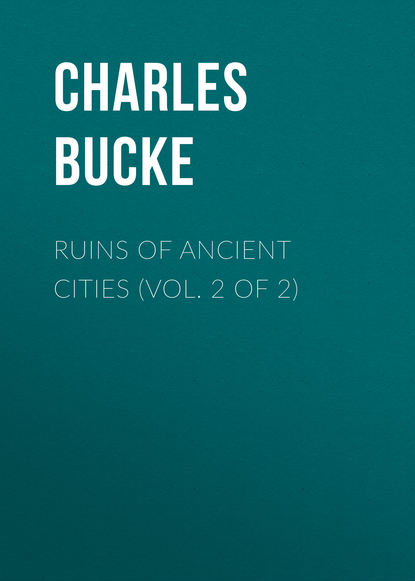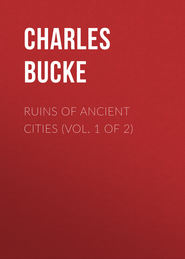По всем вопросам обращайтесь на: info@litportal.ru
(©) 2003-2024.
✖
Ruins of Ancient Cities (Vol. 2 of 2)
Настройки чтения
Размер шрифта
Высота строк
Поля
72
Buckingham.
73
Diodorus; Strabo; Josephus; Appian; Zosimus; Procopius; Benjamin of Tudela; Halifax; Halley; Wood; Prideaux; Rollin; Gibbon; Bruce; Volney; Brewster; Burckhardt; Addison.
74
Chandler.
75
Hobhouse.
76
Pausanias; Chandler; Rees; Hobhouse; Dodwell; Williams.
77
Plutarch; Rees; Pouqueville.
78
This library consisted of two hundred thousand volumes.
79
Tacitus; Plutarch; Choiseul-Gouffier; Rees; Turner.
80
Sir John Malcolm has preserved an account of Jemsheed, from Moullab Ackber’s MSS., which may serve to diversify our page. “Jemsheed was the first who discovered wine. He was immoderately fond of grapes, and desired to preserve some; which were placed in a large vessel, and lodged in a vault for future use. When the vessel was opened, the grapes had fermented. Their juice, in this state, was so acid, that the king believed it must be poisonous. He had some vessels filled with it, and poison written upon each: these were placed in his bed-room. It happened that one of his favourite ladies was affected with nervous head-aches. The pain distracted her so much, that she desired death; and observing a vessel with the word poison written upon it, she took it and swallowed its contents. The wine, for such it had become, overpowered the lady, who fell into a sound sleep, and awoke much refreshed. Delighted with the remedy, she repeated the dose so often, that the monarch’s poison was all drunk. He soon discovered this, and forced the lady to confess what she had done. A quantity of wine was made; and Jemsheed, and all his court, drank of the new beverage, which, from the circumstance that led to its discovery, is to this day known in Persia by the name of zeher-e-khoosh, or the delightful poison.”
81
It is called Nouroze. Some of the sculptures of the dilapidated palace are supposed to represent the processions at this festival.
82
Rollin.
83
Kæmpfer, Hyde, Niebuhr, and St. Croix, regard the ruins as those of a palace: – Della Valle, Chardin, D’Hancarville, and others, as those of a temple. This is a question, however, which many writers regard as being impossible of solution, till an alphabet shall have been discovered of the arrow-headed inscriptions.
84
At the distance of about five miles is a conspicuous hill, on the top of which, and visible to the eye from Persepolis, are the remains of a fortress. This hill is now called Istakhar, and is quite distinct from Persepolis. Of this hill Le Brun has given a drawing; and the original must strike every traveller the moment he enters the palace of Merdusht; as it has all the appearance of having been much fashioned by the hand of man. – Morier.
85
Civil Architecture.
86
Fraser.
87
In allusion to the horns of Jupiter Ammon.
88
Diodorus; Plutarch; Arrian; Quintus Curtius; Pietro de la Valle; Chardin; Le Brun; Francklin, Encylop. Metropol.; Rees; Brewster; Kinneir; Morier; Porter; Malcolm; Buckingham; Ouseley; Fraser.
89
Chambers.
90
Periplus of the Red Sea.
91
Harmonies of Nature.
92
He is supposed to have been poisoned at Akaba, where he died.
93
See Month. Mag. No. 367.
94
Wady signifies a valley; Wady Mousa is the valley of Moses.
95
We may here give place to a few pertinent observations, in regard to the infancy and old age of nations, written by M. Claret Fleurien: – “If we are not disposed to challenge all the testimonies of antiquity, we cannot refuse to believe that the Old World has had its infancy and its adolescence: and, observing it in its progressive career, we may consider it as in its maturity, and foresee, in an unlimited time, its decrepitude and its end. The New World, like the Old, must have had its periods. America, at the epoch of its discovery, appears as if little remote from creation, from infancy, if we consider it in regard to the men by whom it was inhabited: the greater part of its people were still at the point where our ancestors and those of all the nations, at this day civilised, were four thousand years ago. Read what travellers and historians have related to us of the inhabitants of the New World; you will there find the man of the Old one in his infancy: among the small scattered nations, you will fancy that you see the first Egyptians; wild and savage men, living at random, ignorant of the conveniences of life, even of the use of fire, and not knowing how to form arms for defending themselves against the attack of beastsa[310 - Diodor. Book I. Parag. 1. Art. 3.]: in the Pesserais of Tierra del Fuego, the savage Greeks, living on the leaves of trees, and, as it were, browsing on grass, before Pelasgus had taught the Arcadians to construct huts, to clothe themselves with the skin of animals, and to eat acorns[311 - Pausanias. Book VIII. Chap. 1.]: in the greater part of the savages of Canada, the ancient Scythians, cutting off the hair of their vanquished enemies, and drinking their blood out of their skull[312 - Herodot. Book IV.]: in several of the nations of the north and south, the inhabitant of the East Indies, ignorant of culture, subsisting only on fruits, covered with skins of beasts, and killing the old men and the infirm, who could no longer follow in their excursions the rest of the family[313 - Ibid. Book III. and IV. – Val. Max. Book II.]: in Mexico, you will recognize the Cimbri and the Scythians, burying alive with the dead king the great officers of the crown[314 - Ibid. and Strabo.]: in Peru as well as Mexico, and even among the small nations, you will find Druids, Vates, Eubages, mountebanks, cheating priests and credulous men[315 - In the ancient history of Gaul, in that of the British islands, and in all the histories of the ancient times of Europe, of the North, of Asia, &c.]: on every part of the Continent and in the neighbouring islands, you will see the Bretons or Britons, the Picts of the Romans, and the Thracians, men and women, painting their body and face, puncturing and making incisions in their skin; and the latter condemning their women to till the ground, to carry heavy burdens, and imposing on them the most laborious employments[316 - Herodot. Book II.]: in the forests of Canada, in the Brazils, and elsewhere, you will find Cantabri causing their enemies whom they have made prisoners of war to undergo torture, and singing the song of the dead round the stake where the victim is expiring in the most frightful torments[317 - Strabo. Book II.]: in short, every where, America will present to you the horrible spectacle of those human sacrifices, with which the people of both worlds have polluted the whole surface of the globe; and several nations of the New World, like some of those of the Old[318 - The Irish and the Massagetæ, according to Strabo, Book II. – The Scythians, according to Eusebius, Preparat. Evangel. Book II, Chap. 4, and other people of the Old Continent.], will make you shrink with horror at the sight of those execrable festivals, where man feeds with delight on the flesh of his fellow-creature. The picture which the New World exhibited to the men of the Old who discovered it, therefore, offered no feature of which our history does not furnish us with a model in the infancy of our political societies.”
96
Diodorus; Strabo; Pliny; Vincent; Volney; Seetzen; Burckhardt; Irby and Mangles; Laborde; Chambers; Knight.






